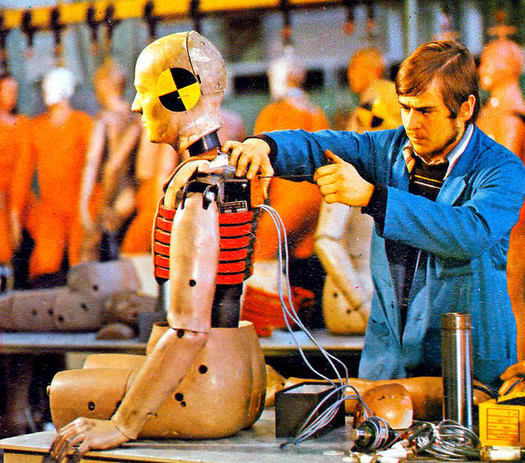The weather report for NYC on Google one day last week told me the temperature was “79°” when it was actually 59°. I realized the info was mistaken because of common sense, but machines don’t yet have that quality nor will they likely in the near run. While I’m sure driverless cars and crowd robotics will reduce auto accidents, the system will always have ghosts, and it’s reasonable to ask whether they will put ghosts in our “machines.” It seems a pretty safe bet that our cognition will shift when we offload driving and navigation responsibilities to algorithms, that some abilities will atrophy, even if we come out ahead in the aggregate. From Katia Moskvitch at the BBC:
“Technology wasn’t supposed to work that way. Manufacturers have supported drivers with power steering, cruise control, antilock brakes and electronic stability controls. Then they gave us sophisticated on-board computers that power car entertainment systems and fine-tune our cars’ performance on the go. Today we drive sleek, aerodynamic vehicles with more computing power than early Space Shuttles.
And yet, in many ways, it’s now the technology itself that’s getting in our way. Yes, today’s cars can help us not just to stay in line, keep to the speed limit and maintain the correct distance to the car ahead. However, there’s also a huge drawback: the more we rely on technology, the less we pay attention to what’s happening around our cars.
Lack of learning
Who, for instance, can confidently adjust all the systems of a car without getting lost in confusing menu choices? Or take something as basic as the cruise control: with our foot off the accelerator, how often do we have to make a sharp brake because we forget to disengage the cruise control?
The problem, though, runs deeper than that. A survey commissioned by in 2008 by UK newspaper The Mirror found that 1.5 million motorists have veered suddenly in traffic when following their GPS instructions without taking notice of the cars around them. And about 300,000 drivers have crashed after following instructions from their satnav.
Then there’s the problem of what happens when the tech is taken away. Drivers who use their GPS daily on regular routes are more likely to get lost on days when their electronic guide is left at home, or out of battery. That’s true even if they make this trip many times over several days, because it’s much more difficult for the brain to remember a navigation system’s step-by-by instructions; on the contrary, it prevents the brain from learning a city’s geography.”
Tags: Katia Moskvitch

